#then to diagnose and implement a wellness plan
Text
I'm rather perturbed at a specialist meeting me for the first time — listening to my concerns that I would like to be on less medication for pain management, renew an active lifestyle, etc and need health advice on a course of action to get to that goal— and in the course of 10 minutes they feel adequately informed enough to summarize not only my life, my hardships, my personal character, but tell me that this lifelong "struggle" will only get worse as I age, and then proceed to prescribe me not only with a higher dose of my current medication but adding a low dose of new medication that, among other things, may cause/increase anxiety, mood changes, depression, oh by the way you shouldn't get pregnant, and needs to be tapered on and off under medical supervision.
They know me well enough in ten minutes, without so much as a full physical, to reduce me to the sum of my problems — but fail to deduce that mental health is already one of my causes for concern — and prescribe me more medication that I don't want and am apprehensive about. I felt utterly statistical, invisible, and dismissed. It's one thing to be frank and say, "there's nothing in my scope I can do for you" which I would be upset but not angry about, and quite another to say "based on my extensive XP, here's your answer, your concern about meds is trivial so take more."
Do I bother with the struggle for a second opinion when it was hard enough to get in the door in the first place? Or do I laugh at my own stupidity for even trying to see a specialist to begin with?
#social commentary#healthcare#we don't have a healthcare system#we have a sick care system#where it's cheaper and easier to prescribe Rx#then to diagnose and implement a wellness plan#is it an MD or is it hubris#cp life#chronic pain#I've never had a doctor's appointment make me that upset and thoroughly invisible#self advocacy#advocacy fatigue#health insurance#mood#personal#pain management#joint pain#back pain#polyarthritis#polyarthralgia#the Rx system#it's killing me
2 notes
·
View notes
Text
Dennis Reynolds is AUTISTIC!!!!
(At least, I headcanon him as such).
Here's why:
Sensory issues:
If you've watched the show, you probably already know what I mean, but Dennis really struggles to deal with sensory input. When there's a loud noise, he often covers his ears- like in Family Fight:

or he gets frustrated, lashing out at diners for being too loud (The Gang Dines Out), getting annoyed at Frank for chewing gum too loud.
It's worth noting that later on in this episode, Dennis can hear Frank chewing gum from the other room. He's clearly hypersensitive, and perhaps this even goes to explaining a little bit why his room is soundproofed? Could it be that rather than not wanting people to hear what's going on inside, he's desperate to block the noise coming from outside?? (this was suggested by @kod-lyoko , and I LOVE IT).
There are SO many examples of Dennis plugging his ears (often when the others don't react in such a strong way):
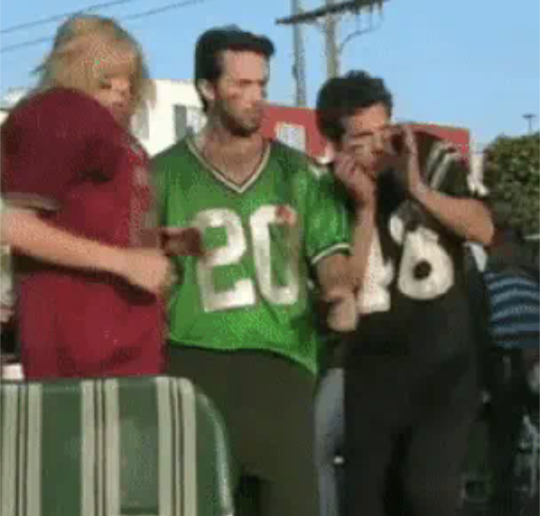


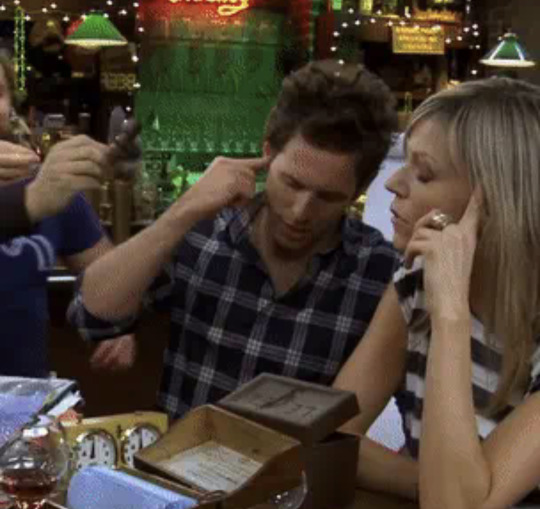
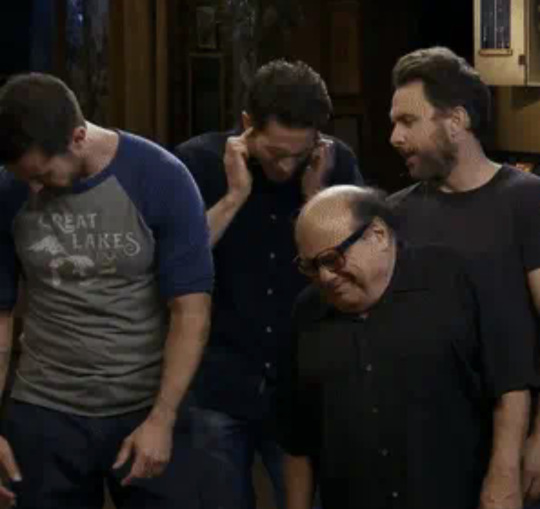
There are way too many examples to list here, and too many images I could give (the above were taken from @dennisboobs ' gif set) but hopefully you get the impression.
Social issues:
I feel like this one is pretty self-evident, but I find deconstructing the things Dennis does super fun, so I'm going to explain anyway: Dennis does NOT know how relationships work. There are a great deal of factors at play to cause this (I would argue that his early experiences in life definitely moulded his view in an unhelpful way) but the systematic way he looks at interactions REEKS of autism to me.
The DENNIS system is hardly peak autism representation (it's certainly not the bright and bubbly stuff people often talk about), but the fact that he has a system for romantic/sexual interactions, both for men AND women, feels super autistic-coded. He quite literally has a script which he follows to make interactions easier, one which he sticks to rigidly. And if anybody tries to implement this carefully thought out system incorrectly? Well, he'll let you know (e.g in The Dennis System episode where he blows up at Mac and Charlie for not getting it right at the fair).
He masks his social deficits well, but sometimes things don't go to plan. Sometimes, the girl on the cruise ship runs away, and Dennis announces that 'that's not supposed to happen'.
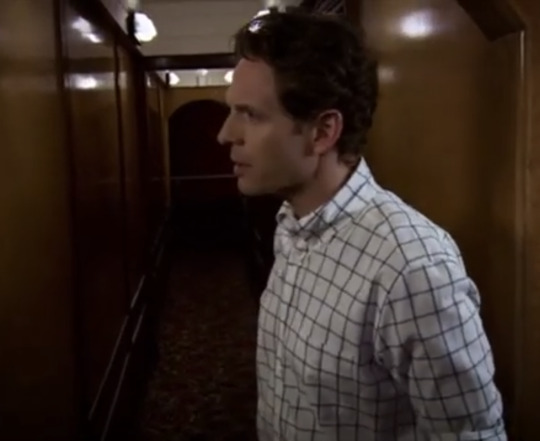
He comes off as creepy, but that's not his intention. He doesn't understand the way he's perceived by others in general- he thinks he's the King of St Joseph's, not realising he was actually an outcast all along. Just like a lot of autistic people, he didn't understand that he was on the fringes of society until it was thrust in his face, and that hurt.
Speech:
While Dennis often appears to speak pretty normally, there are a few occasions where his frustration causes this mask of normality to slip.
In The Gang Finds a Dumpster Baby, Dennis is caught off guard by the hipster's reading of him, and immediately goes back to Frank and Charlie, parroting almost the same words he heard right back to them, despite not seeming to understand them at all (perhaps a form of echolalia?).
"I'm out here trying to make a difference, and you're over here rummaging around in the trash like a couple of narcs! Okay, you can't just come down here with your mainline cashmere, mousse... quaff... hairspray, and start being like, a suburban tool!"
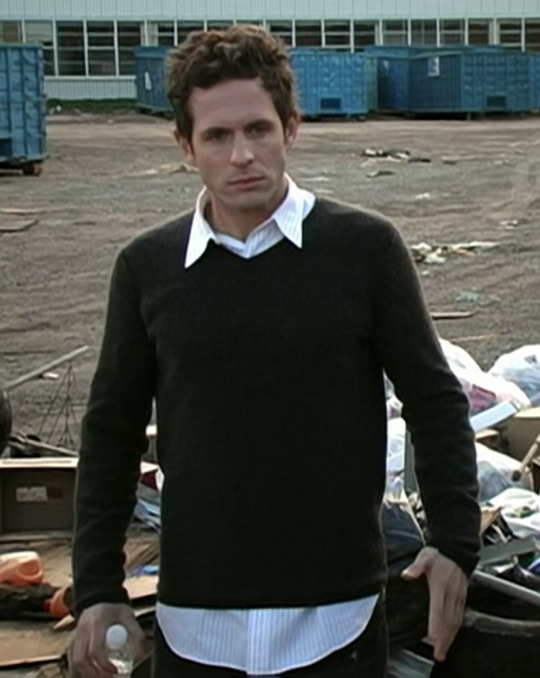
It's also worth noting that even the poetic way he speaks when he's angry could be a trait ?? As a recently diagnosed autistic person, in my report they spoke about how I used 'idiosyncratic' language (basically, peculiar language lol), and listed terms like 'connoisseur', which I guess were deemed pretty formal for casual conversation.
And it got me thinking, who else do we know who uses VERY idiosyncratic language? Dennis. Reynolds.
"The thunder of my vengeance will echo through these halls, like the gust of a thousand winds"
"Begone, vile man, begone from me!... I am untethered and my rage knows no bounds!"
"You didn't tell me there was to be pollen!"
Etc... etc...
The way he repeats 'savages, idiots!' during his rage at the frat bros feels very autism coded to me. Repetition of certain words and phrases is common!
Heightened emotions:
Again, something that I didn't know until I myself was diagnosed is that for a lot of autistic people, we spend most of the time at a pretty 'flat' emotional state, but when we do experience emotions, we experience them intensely. Frustration turns into anger, sadness turns into despair, happiness turns into ecstasy- it's why some autistic people might be misdiagnosed with bipolar disorder!
This, of course, fits well with the way Dennis experiences emotions. He spends a lot of the time believing he doesn't have any at all, and when he does feel something, it's overwhelming.
"And I have feelings! Of course I have feelings, I have big feelings, okay? And it hurts."
These lines hit hard regardless of the extra weight you put on them, but when you see them through the lens of autism, through the lens of a lifetime of misunderstanding and overstimulation, it makes them hit even harder.
It hurts him to feel. His emotions are so strong that they're painful, and he's never been taught how to deal with them, because nobody even knew he had them in the first place.
Stimming:
Finally, I think Dennis stims. A lot. If you search up 'Dennis Reynolds autistic' on this very site, you'll find gifsets and videos illustrating this.
He has a few very common ones, like tugging on his earlobe when he's anxious, playing with his fingers, etc, but if you pay attention to him even when he's in the background of scenes, you'll pick up on a lot. Dennis is constantly moving, and while you could suggest this is simply a result of Glenn's ADHD, I'd argue that some of these stims happen so frequently in Sunny specifically, that there's no way they're coincidental.
Glenn makes a lot of very specific acting and directorial choices in Sunny, so why dismiss these as choices too?


That's all I can be bothered to type up now, but here's my case for Autistic!Dennis ! Of course, he's a complex character so there's always room for different interpretations...
but as an autistic person, I hereby claim him as One Of Us™.
162 notes
·
View notes
Text
Iam not usually one to offer diagnoses of people I’ve never met, but it does seem like the pundit class of the American media is suffering from severe memory loss. Because they’re doing exactly what they did in the 2016 presidential race – providing wildly asymmetrical and inflammatory coverage of the one candidate running against Donald J Trump.
They have become a stampeding herd producing an avalanche of stories suggesting Biden is unfit, will lose and should go away, at a point in the campaign in which replacing him would likely be somewhere between extremely difficult and utterly catastrophic. They do this while ignoring something every scholar and critic of journalism knows well and every journalist should. As Nikole Hannah-Jones put it: “As media we consistently proclaim that we are just reporting the news when in fact we are driving it. What we cover, how we cover it, determines often what Americans think is important and how they perceive these issues yet we keep pretending it’s not so.” They are not reporting that he is a loser; they are making him one.
According to one journalist’s tally, the New York Times has run 192 stories on the subject since the debate, including 50 editorials and 142 news stories. The Washington Post, which has also gone for saturation coverage, published a resignation speech they wrote for him. Not to be outdone, the New Yorker’s editor-in-chief declared that Biden not going away “would be an act not only of self-delusion but of national endangerment” and had a staff writer suggest that Democrats should use the never-before-deployed 25th amendment.
Since this would have to be led by Vice-President Kamala Harris, it would be a sort of insider coup. And so it goes with what appears to be a journalistic competition to outdo each other in the aggressiveness of the attacks and the unreality of the proposals. It’s a dogpile and a panic, and there is no one more unable to understand their own emotional life, biases and motives than people who are utterly convinced of their own ironclad rationality and objectivity, AKA most of these pundits.
Speaking of coups, we’ve had a couple of late, which perhaps merit attention as we consider who is unfit to hold office. This time around, Trump is not just a celebrity with a lot of sexual assault allegations, bankruptcies and loopily malicious statements, as he was in 2016. He’s a convicted criminal who orchestrated a coup attempt to steal an election both through backroom corruption and public lies and through a violent attack on Congress. The extremist US supreme court justices he selected during his last presidential term themselves staged a coup this very Monday, overthrowing the US constitution itself and the principle that no one is above the law to make presidents into kings, just after legalizing bribery of officials, and dismantling the regulatory state by throwing out the Chevron deference.
Trump’s own former staffers are part of the Heritage Foundation’s team planning to implement Project 25 if he wins, which would finish off our system of government with yet another coup. “We are in the process of the second American revolution, which will remain bloodless if the left allows it to be,” said the foundation’s president the other day. This alarms me. So does the behavior of the US mainstream media, which seems more concerned with sabotaging the only thing standing between us and this third coup.
“Why aren’t we talking about Trump’s fascism?” demands the headline of Jeet Heer’s piece in the Nation, to which the answer might be a piece by the Nation’s own editor-in-chief titled “Biden’s patriotic duty” that proposes his duty is to get lost. Sometimes I wonder if all this coverage is because the media knows how to cover a normal problem like a sub-par candidate; they don’t know how to cover something as abnormal and unprecedented as the end of the republic. So for the most part they don’t.
Biden is old. He was one kind of appalling in the 27 June debate, listless and sometimes stumbling and muddling his words. But Trump was another kind of appalling, in that almost everything he said was an outrageous lie and some of it was a threat. I get that writing about the monstrosity that is Trump faces the problem that it’s not news; he’s been a monster spouting lurid nonsense all his life (but his political crimes are recent, and his free-associating public soliloquies on sharks, batteries, toilets, water flow and Hannibal Lector, among other topics, are genuinely demented). He’s a racist, a fascist and a rapist (according to a civil-court verdict).
We are deciding whether this nation has a future as a more-or-less democratic republic this November, and on that rides the fate of the earth when it comes to acting on climate change. If the US falters at this decisive moment in the climate crisis, it will drag down everyone else’s efforts. Under Trump, it will. But the shocking supreme court decisions this summer and the looming threat of authoritarianism have gotten little ink and air, compared to the hue and cry about Biden’s competence.
Few seem to remember that Biden’s age and his verbal gaffes were an issue in the 2020 campaign. Biden is a lifelong stutterer, and the effort to keep his words on track means that he operates under an extra burden with every unscripted answer he gives, particularly under pressure (though he had a long, easygoing conversation with Howard Stern a couple of months ago, in which he discusses his stuttering at about the 1:13 mark).
Some speech pathologists have suggested he may (not does, just may) have a disorder that sometimes accompanies stuttering, called cluttering, which is not an intellectual deficiency but a sometimes hectic and disorderly translation of thoughts into words. In recent months, actual gerontologists have said in print that Biden appears to have normal signs of aging, not signs of dementia. Nevertheless, the amateur armchair diagnosticians have been out in packs, and their confidence in their ability to diagnose from watching TV is itself an alarming delusion. I am not giving Biden a clean bill of health; I’m saying that I don’t have a basis to render a verdict (and neither do the august editors of large publications).
Few seem to remember that Biden’s age and his verbal gaffes were an issue in the 2020 campaign
Although the Biden administration seems to have run extremely well for three and a half years, with a strong cabinet, few scandals and little turnover, a thriving economy and some major legislative accomplishments, the narrative the punditocracy has created suggest we should ignore this record and decide on the basis of the 90-minute debate and reference to newly surfaced swarms of anonymous sources that Biden is incompetent. Quite a lot of them have been running magical-realism fantasy-football scenarios in which it is fun and easy to swap in your favorite substitute candidate. The reality is that it is hard and quite likely to be a terrible mess. Nevertheless, this pretense is supposed to mean that telling a presidential candidate in mid-campaign to get lost is fine.
The main argument against Biden is not that he can’t govern – that would be hard to make given that he seems to have done so for the past years – but that he can’t win the election. But candidates do not win elections by themselves. Elections are won, to state the obvious, by how the electorate turns out and votes. The electorate votes based on how they understand the situation and evaluate the candidates. That is, of course, in large part shaped by the media, as Hannah-Jones points out, and the media is right now campaigning hard for a Democratic party loss. The other term for that is a Republican victory. Few things have terrified and horrified me the way this does.
Rebecca Solnit is a Guardian US columnist. She is the author of Orwell’s Roses and co-editor with Thelma Young Lutunatabua of the climate anthology Not Too Late: Changing the Climate Story from Despair to Possibility
17 notes
·
View notes
Text
Did Martin's Therapy In Claremont's Psychiatric Facility Actually Have a Positive Effect on Martin?
When we are officially introduced to Martin Whilty in the TV Series "Prodigal Son" we learn that he's been in Claremont Psychiatric Facility for at least 20 years. So that begs the question, did Martin Whilty actually benefit from the therapy and medications he was given in his incarceration in Claremont? It is said numerous times that Serial killers are made not born and therapy is meant to be used as a tool to safely deal with and talk about childhood trauma or any life traumas we may have faced and been affected by.
It's safe to say that Martin was given a mix of solo therapy sessions and group therapy sessions throughout his incarceration in Clarmont (before he escaped in Season 2 Episode 10 I believe). He would have also been given a mild sedative for aggression and/or irritability as well as possibly some mood stabilizers (we don't know what medications Martin was given or if was given any medications besides Benzodiazepines a.k.a Benzos).
However, it's safe to say that Martin was probably given different kinds of drugs to help calm him and stabilize his mood throughout his stay. It's also important to note that therapy would also be implemented in his treatment plan. So the question I have is the following:
Was the therapy actually effective in changing Martin's mindset on murder, and did it allow him to genuinely care for his son, Malcolm?
We don't get a clear answer for this in the two seasons of "Prodigal Son", however, we do get subtexts that suggest that Malcolm is in denial of his father's improved mental state due to Martin being diagnosed as a megalomanic Narcissist who craves power and control. So it's safe to say that Martin's "love" for his son Malcolm became more of an obsessive desire to prove his worth to his son Malcolm.
As the events in "Prodigal Son" unfold we see Martin Whilty desperately trying to do everything in his power to prove to his son Malcolm that he is a changed man. Martin starts to prove this by helping Malcolm solve murder cases. This action alone is enough for Malcolm to become slightly more dependent on his father's input on the cases he's working as well as ensure that Malcolm visits Martin more often.
However, these simple interactions are not enough for Martin to prove to Malcolm that he (Martin) is indeed a changed man. We also see Martin becoming obsessed with the idea of being good, which in itself, is also a quite toxic mindset. This is because obsession, whether over something good or bad can result in toxic, manipulative behaviors that can be more hurtful than good.
In Martin's case, his obsession with proving himself a changed man results in Martin manipulating his fellow inmates into doing actions that result in Malcolm, and at some points Ainsley, being in Martin's cell and giving Martin the ample opportunity to further manipulate his children, mostly Malcolm into believing that he, Martin is a changed man.
Now that's not to say that a part of Martin is indeed a change man in some way. It's a big improvement for Martin to say multiple times that "murder is wrong" given the fact that he killed 23 people when he was an active serial killer. Now, that's not to say he completely changed. After all, psychologically he can't stop being a serial killer because he'll always have the urge to kill someone.
So we have to take into consideration that he can fight the urge to kill someone and that by the time we officially meet Martin in the present day, he's roughly 55 years old, so he doesn't have the physical capacity to continue killing someone, even if he wanted to. He's also been incarcerated in Claremont Psychiatric Facility for 20 years and has grown to only really care for Malcom visiting him.
So, it's safe to say that he's changed somewhat. but not completely. We get to see in the finale of Season 2, that Martin doesn't kill anyone nor does he go into his "old ways". He instead abducts his son Malcolm and attempts to bond with him by solving a missing person's case that ties into a local serial killer (not Martin of course). The goal of this was to ultimately prove to his son that he "doesn't want to murder anymore" and that he's "a changed man" to some degree.
However, when Malcolm finishes solving the case he calls in the location of the victim that they saved, as well as Martin Whitly's location. This action proved to Martin that his son would never accept him in any capacity and also proved that Martin wasn't as changed as he claimed to be. Especially when Martin decided to kill his son. This action proved that he was still "the monster" that Malcolm said he was while also showing that he still craved control, especially over his family.
So, did the therapy that Martin underwent at Claremont really help Martin? Well yes and no. Yes, it helped him realize his own toxic behaviors however it didn't help him to stop those behaviors. Therapy actually helped Martin to better hide those behaviors. Yes, it did help him to somewhat change and understand that murder is wrong, and helped him not want to murder anymore.
It also gave him the tools to become obsessive with his love for Malcolm and his family. Now that doesn't mean that Martin doesn't on some level truly love his family. It just means that Martin struggles between how to love someone and what loving someone actually entails. Due to his nature as a psychopath, he doesn't have the capacity or ability to feel/express empathy, sympathy, or remorse, however, that doesn't mean he can't on some level "love" someone. It just means he can't understand or empathize with someone else.
That said, we can safely say that therapy helped him somewhat but not completely because Martin himself didn't allow the therapy to truly be effective in changing his mindset and personality. Instead, he used it as a tool to further his obsession with Malcolm, and even went as far as manipulating the Claremont staff into getting him a job with a staff member who had a gold card once he learned that a gold card can open ALL areas of Claremont.
#prodigal son fox#prodigal son#martin whitly#malcolm bright#ProdigalSonTheories#Thoughts#MartinWhitlyMusings#musings#tom payne#MichaelSheen#serialkiller#therapy#psychology
11 notes
·
View notes
Text
I've always headcannoned Jack as autistic, but like, diagnosed later in life??
Because I can just imagine him getting diagnosed in his twenties in the off season and having some Big Feelings and Realizations. Like, realizing how he'd partially used alcohol to put a damper on overstimulation at parties when he was younger, and understanding why he had always had so much trouble figuring our how to interact with people (and therefore why he'd had so few friends growing up), so on and so forth.
And he'd tell a few trusted people, probably Bitty and Lardo and Shitty and Tater, because he understands himself better now, and he wants the people he loves to understand him better too. And they all start reading up on autism and accommodations, and Bitty talks to Jack about having ADHD and they grow even closer through their shared experiences with neurodivergency. In the end, though, it's Tater who goes above and beyond.
He's very careful not to out Jack to the team before Jack's ready, but Tater devises a plan. He convinced Georgia that the Falconers should do some outreach with a local Autistic Children Support Group, raising money and inviting the kids to practice. And then he not so subtly suggests to the rest of the team that they should get educated on Autism as well.
And the thing about accommodations is that they benefit everyone, so while the Falconers are researching they find accommodations to implement at the rink, to both help any potential autistic people on the staff or team, but also because they just generally sound nice. So they get permission from management, and they add light dimmers in the locker rooms so its not glaringly bright. They designate an unused office as a quiet room, filling it with pillows, blankets, and sensory toys to help with anxiety before games and cool down afterwards. Thirdy reads about info-dumping, and he thinks the idea of sharing information you love is super cool, so he sets up some optional team bonding power-point nights (some for serious power-points, some for silly ones).
And Jack comes back for training and hears Snowy talking about how they need to make sure that the merch they give the autistic kids in the upcoming event is sensory-sensitivity friendly. And he sees all the accommodations that have been built into the rink over the summer. And he feels so goddamn seen, even if the Falconers don't know that he's autistic as well. (He tells most of them pretty quickly after that. He knows he doesn't half to, but seeing how accepting they are makes him feel safe enough.)
Idk, just. Radically inclusive Falconers crushing hockey stereotypes one at a time. That is all :D
#jack zimmermann#autistic jack zimmerman#tater#alexei mashkov#autistic author#actually autistic#omgcp#lancerambles
135 notes
·
View notes
Note
dump all your ideas abt ur summer camp au i want to hear it
ahhhhhh first of all anon ily <333
here’s my ideas for the summer camp au so far :)
- it’s called quesadilla summer camp (im so creative lmao)
- the camp was created on an experiment. if it went well, they would implement the plans on a larger scale. (what’s the experiment? it’s assumed it has something to do with crossing the language barriers but no one actually specifies)
- all participants get college scholarships
- but the whole thing is really badly executed? like it just does not have the set up or functionality of a normal summer camp
- there’s just very little supervision or guidance
- the camp is run by some version of the duck, and they’re very uninvolved which leads cucurucho and zero to just Not Care.
- counselors are rubius, cucurucho, and the code entity
- the code entity goes by zero
- zero really doesn’t talk but they all learn pretty easy it’s how fucking awful of an idea it is to piss them off
- cucurucho and zero are they/it besties
- rubius is the same age/around the same age as the campers, cucurucho and zero are older
- sometimes one the campers walks into their cabin and sees an entirely new person in their cabin, which is normal. they switch cabins constantly
- the first week people just keep. randomly wandering off. “where’s wilbur?” two hours later wilbur walks out of the woods with a rock. (not even like a cool rock. it’s just a normal fucking rock)
- phil’s the mom friend. but he’s still a disaster. he’s just the only one with any shred of responsibility. he’s also just got an aura of trustworthiness that makes everyone trust him with their problems
- fit is just. so chill
- he also just? always has what you need? “yeah sorry it’s a bit hot in here, a screw that seemed important fell out of the fan earlier so we haven’t turned it on yet” “oh! i think it’s in here- nope screwdriver’s in the left pocket, where did you say the screw was?”
- dan just kinda disappears for a bit? cucurucho tells the campers he went on vacation but they don’t entirely believe them. dan comes back a little different.
- spreen is always either starting chaos or nowhere to be found
- quackity manages to keep putting himself in the middle of like every problem whether he’s involved or not
- however charlie pretty much is always involved
- luzu is had DID and arin is an alter
- luzu does know about arin but he was just diagnosed and is still figuring it all out
- roier flirts with everyone (except jaiden, he respects her boundaries)
- wilbur brought his guitar with him and sings at the campfire some nights
- charlie only joins in on the meme songs
- jaiden finds the most. random shit. “hey guys i found $20 stuck to the bottom of the picnic table with a piece of gum” “oh dude look! a patch of four leaf clovers!” “woah look at this cool bottle cap i just found!”
- maximus is a conspiracy theorist but in like a, hey this actually genuinely makes sense kind of way
- bad is terrified of spiders
- he saw one in the bathroom of his cabin and was completely moved in to a different cabin within seven minutes
- roier finds this hilarious
- foolish and vegetta are dating. no one knows how they got together or when they got together. if you ask either of them, you’ll get two completely different answers
- the brazilians join two-ish weeks in
- they all arrive together in a bus together and have already formed a Friendship on the journey there
- the bus was almost set ablaze 4-6 separate times (depends on your definition on separate)
- there is an extremely done cucurucho driving the bus
- forever sees phil and immediately turns to tell felps how that is the man of his dreams
- mike and pac are inseparable. they’re just kind of always within the vicinity of each other.
- cellbit, bad, foolish, and maximus attempt to take over the camp together. it doesn’t go as planned.
#im so tired lmao i would not be surprised if half of this is incomprehensible#qsmp#qsmp au#qsmp summer camp au#qsc#twig speaks
57 notes
·
View notes
Text
Results of today’s evaluation behind cut. Feel free to scroll on by if you’re not so interested.
The results are in! I got roughly the results I expected, with some nuances mixed in.
I strongly fit the criteria for autism, so my neuropsych formally diagnosed me with that. He also labeled me as “very likely ADHD” with a hyperactive presentation. (He said he was on the fence about whether to label me hyperactive or combined presentation, but ultimately went with hyperactive.)
We then went into the specific strengths of my brain as well as some of the areas where I struggle. Generally speaking, I scored very high in verbal skills, and also was strong as far as pattern recognition and memory. Places where I scored quite low were in things like planning and starting tasks, and my processing speed is much slower than average. Overall this contributes to inertia.
I apparently totally bombed the attention test they give you on the computer, where you have to click when you see certain shapes. I expected I wasn’t doing super well, especially as the test went on, but apparently I bombed way more than I thought without realizing it. I have to laugh about that because this is the kind of perspective you can get from this kind of evaluation!
What was neat about this was I got to see the ways that the little things connect to the bigger things, so the way that like, my slower processing speed can make it harder to grapple with a lot of information at once and so on. Like I’ve known the larger things I struggle with, and now I can see what about my brain makes them hard.
For flavor, I also have mild alexithymia. I mean I knew that already but I have data to back it up now.
Anyway, I’ve got accommodations I can use if I want to use them, and some concrete suggestions for moving forward with my life in a sustainable way. I don’t know how I’m going to implement it all yet, but I’ve got time. And this feels like crucial information for how not to overstress my bodymind. So that was neat and I am pleased!
10 notes
·
View notes
Text

My mom has been battling stage 3 pancreatic cancer and 2 days ago, she completed her 4th chemotherapy session. She has 2 more to go before they assess it to remove the tumor.
She was diagnosed on November 28, 2023. She began chemotherapy December 26, 2023 and was admitted to the emergency room later that day from complications. She was discharged December 29, 2023 and my family came down to Florida on December 30, 2023.
On her birthday, January 2, 2024, after her follow-up meeting with her oncologist. She was feeling defeated about how things had been happening since her diagnosis. She vocalized no desire to live in front of us (including my 12 year old daughter (her only grandchild)).
My family (my spouse, daughter & myself), at the suggestion of my spouse made the commitment to be her ongoing support system. This is so she could make whatever decision she wanted regarding how she chooses to proceed with her diagnosis.
I personally committed to split time between our 2 bedroom home in Durham, North Carolina & her 1 bedroom apartment in Fort Lauderdale, Florida to make sure we could commit to her health treatment planned as it began taking effect on December 26, 2023.
We did not request anything from anybody and agreed to take on the additional financial burdens it would place on us to fulfill this commitment, (despite knowing we weren't in the financial situation to do so).
We arranged things so my spouse and daughter could return to school in NC on January 8th. I stayed back with my mom for that chemo week. Since I'm a business owner with time flexibility, I would make the trips and stay with my mom throughout the treatment windows in Florida.
This agreement means renting a car for an one-way trip to North Carolina or Florida weekly (a $200-275 expense & 11-14 hours of travel time per trip). The first time we brought her up to NC ever, my spouse drove our car down to get us and then shared in the responsibility of driving back to NC. It cost us $250 in fuel and food for the trip. We realized it gave my mom & I more flexibility in travel days, saved on time spent on the road, and cost the same to just rent a car (Chevrolet Malibu) for each trip.
This agreement meant now sourcing food with all my mom's health dietary restrictions (from having a gastric sleeve) & her diagnosis dietary restrictions for 2 households. As well as me preparing most meals for both homes while I'm in and away from NC. In addition, replacing gluten with gluten-free alternatives in the diet. (A lot more coconut and almond based supplies). Cooking meals for a family of four that works and can be considered Keto-friendly and cancer friendly and while trying to stay under a budget of $300-$350 monthly.
Since we've implemented this plan to be her support system, all hell has broken loose in our lives. (My mom calls it just life lifing though).
On Martin Luther King weekend, began a school district wide issue in my Daughter's school system. Different staff began protesting and calling out of work (which we personally support their stances) due to significant pay discrepancies being communicated.
This immediately meant unreliable transportation for my daughter getting to & from school 25+ minutes away. My spouse teaches in a different school system 20 minutes in the opposite direction of my daughter's school, and we only have one car. Since she started middle school this year, their school school arrival times are the same. But her bus pick-up time solved the problem there. So there is now an ongoing possibility of him being late to work at his school daily.
On our first trip back down for treatment, it went perfect with the rental, until I realized after returning the rental car that I had lost my business cellphone inside of the rental car. (It hasn't been found by Budget's staff during cleaning and the car had already been rented out again less than 2 hours after being dropped off.) So I still have to pay to get that phone replaced.
This is compiled on top of this being my businesses' slow season and having no reserves to catch the $950 overhead in monthly expenses that comes from inventory space, business insurance, & hosting email domains, office assistant services & website. We only one future booking on the calendar and it's for a new build. January there was only $900 made. $300 had to go towards having to subrent out the job because it over lapped with chemo treatment and would cost twice as much to keep in-house with temp staff. $150 went towards repaying our transaction based capital funding loan from Shopify. $120 went towards getting 2 items of inventory for the second booking.
So I borrowed funds from something I couldn't afford to take from just to keep all of our inventory spaces secured.
My Chase credit card is over the limit by $140 and a payment is due today. My secure loan payment with Navy Federal is also due today and I don't have any of it. My business insurance payment of $200 is due tomorrow, and I don't have that either.
And the difference in the cost for our last car rental to come down for chemo week is still due back to the card I used for it. And I have to pay 200 for the car rental to go back up to NC Monday.
Then back in NC, this week on Tuesday, our only car's engine light came on. It was taken into our dealership on Wednesday morning to find out why. That diagnostic end up costing $250. We finally got answers Friday afternoon. Our car has 139k miles on it, and we're being told the engine needs to be replaced. It has been quoted $8k to have a used engine put into it or over $12k to have a new engine with a lifetime warranty put into our 2016 Chevrolet Cruze premier.
This car gets everyone to school and has been how my spouse has been supplementing his income working for the school system and parks & rec by doing Shipt. So now income has been reduced even more and expenses have drastically increased more.
MY business first official rental booking for this year took place yesterday, and that was supposed to be able to be delivered using our car. Since it's still in the shop, we had to book a last-minute $200 car rental for my spouse and daughter to fulfill the booking delivery yesterday and to be able to go back to do the rental booking pick-up today.
Emergency fund is pretty much exhausted after this week and the savings, too. Then today, with a little downtime, I learn that all my email payments were due on MLK weekend. This resulted in 5 email domains (3 important ones needed for tax filings) to be canceled by godaddy after 2 weeks of missing the payment notifications. I've had the email plan for almost 10 years, and it initially only cost me $14/month for all 5 emails. But because it was canceled and the package no longer exists, it cost me $29/month to have them reactivate and restore the 3 important emails or over $70/month to get them all reactivated. I only activated the 3 and paid it up until April for $59, so I don't miss its before filing taxes.
This week in Florida, my mom's cancer treatment visits started charging her a copay. Due to an error that recently took place on the backend by her health insurance. It's taking longer to resolve it with then despite them already seeing that it'san error in their coordination of benefits process. This week alone, we had to pay $325 in co-pays just to avoid the chemotherapy and white blood cell visits at the oncologist from being canceled by their office. The error is still causing a previous $200 outstanding balance to reflect on her account.
TODAY, it all became too much to hold in any longer. I have never had to face this many trials all at once while still having ongoing ones coming my way. My heart, mind & spirit is heavy right now. I need GOD to do something supernatural for my family in this season. In a way, only God can show up. I'm not broken. My faith isn't shaken. We're not going back on our commitment. Cancer won't defeat my family! We're breaking so many generational cycles right now. Cancer was just the catalyst to expedite the process.
6 notes
·
View notes
Note
Not to be pedantic but the weird eugenicist fantasy wouldn't select for high estrogen males because they're talking about testing for the genetic component, and not the baldness itself. That being said if it became reality I'm sure it'd inevitably descend into that because I'm not sure if genetic testing for male pattern baldness exists and even if it does testing everyone for it would be an absurd effort. For baldness? Why is baldness what this guy thought of skfjsjfdjd. Also like they clearly don't understand how male pattern baldness works because females cary the gene too. Also like isn't it more common than not? Is this guy proposing that the majority of people are sterilised wtf.
well, yeah that's the thing, they wouldn't be able to test for it genetically, so the only thing they could do would be to medically diagnose the onset of male pattern baldness, and then sterilize whoever has it; hence they would most likely weed out men with high testosterone first if they actually adhered to this example plan
and yeah of course it's nonsense, all eugenics are, any attempt to put the ideology into practice as envisioned dies the second it touches medical reality, and as such can only descend into the actual political intent its proponents have: to punish, enslave and murder those they deem undesirable according to their fascist ideals
the baldness example doesn't exist because these people actually believe that's a viable plan, it's a trojan horse to get people who aren't educated enough to see its stupidity onboard with fascist talking points; if these people ever get the power to implement eugenics it won't be baldness they ''cure'', it will be ''low IQ'' based on racially biased testing so they can bring back chattel slavery and ''autogynephilia'' so they can murder trans women etc. etc.
4 notes
·
View notes
Text






























Eat Ice Cream for Breakfast Day
“Life is short, eat dessert first” is a phrase that has been bandied about by a lot of people for reasons both flippant and serious. Although it probably sounds like all fun and games, Eat Ice Cream for Breakfast Day is one of the more serious embodiments of this phrase, serving to increase awareness about childhood cancer.
For children whose lives may be cut short and who see every day as a blessing, it only makes sense to indulge in life’s little pleasures. And Eat Ice Cream for Breakfast Day brings that opportunity to everyone in support of this important cause.
History of Eat Ice Cream for Breakfast Day
Eat Ice Cream for Breakfast Day was created to commemorate the nine wonderful years of the bright soul that was Malia Grace, born on February 18, 2001. Malia, who passed away after a long fight with cancer on Dec 7, 2010, was an inspiration to everyone around her.
Those who knew her saw that she glowed with the kind of enthusiasm for life that childhood is made of. She embraced knowledge and learning every day, getting outside whenever possible and drinking in her short life with a passion that made each day a new and exciting adventure of its own.
First celebrated on her birthday in 2013 by a group of close friends of Malia to commemorate her life and creativity, the event started out small and was shared with just a few folks on social media. In 2014, the event went public and opened up to include 55 other families of children with cancer.
Eat Ice Cream for Breakfast Day went on to become a day to honor all of the children who have battled or are battling childhood cancer. It didn’t take long for the day to explode onto the scene, with thousands of people from all over the world taking part and spreading the message to thousands more.
How To Celebrate Eat Ice Cream for Breakfast Day
Observing and celebrating this day is about more than just the actual act of eating ice cream for breakfast. It’s a day to get involved in the effort to encourage children who have cancer and make an effort to put an end to this terrible disease. Try out some of these ideas for getting involved in this worthy cause:
Make a Donation to Fight Childhood Cancer
For those who are not into ice cream or would like to promote this good cause in other ways, why not look for local hospitals and healthcare centers that are in need of donations, as they help parents and children fight this terrible disease? Certainly, many dollars are needed to research and develop cures for the various cancers that affect children in particular.
St. Jude’s Children’s Hospital, Alex’s Lemonade Stand Foundation, Children’s Cancer Research Fund, Make a Wish Foundation, Ronald McDonald House, and the American Childhood Cancer Organization are just a few of the organizations that offer hope and support to children with cancer as well as their families.
Host an Ice Cream for Breakfast Day Fundraiser
Hundreds of children every year benefit from the efforts of various hospitals and organizations. Putting together an Ice Cream For Breakfast Social can help raise spirits and morale, as well as awareness for the need. Grab a few friends and make a plan for serving ice cream in the morning and asking for a donation. Make it a social event at the office, at a school or in the community. Lots of creative ideas can be implemented to make this day special while spreading the word and raising some finances that can be donated to one of the above charities.
Learn Facts About Childhood Cancer
Most people don’t think a great deal about childhood cancer until it happens to them or someone they know and love. But the reality is that it is more prevalent than most people realize. Here are some important things to know and stay informed about childhood cancer:
Globally, more than 300,000 children are diagnosed with cancer every year. Worldwide, this equals a cancer diagnosis for a child every three minutes.
Childhood cancer causes approximately 90,000 deaths each year all over the planet.
70% of childhood cancers are curable, assuming they are caught early and have access to appropriate treatment protocols.
Many families whose child has cancer feel very alone and isolated, so connecting with them through events like Eat Ice Cream for Breakfast Day is a very encouraging act.
Volunteer at a Children’s Hospital
This might be the day to contact a local child oncology ward and find out what kinds of supplies they need, or arrange to be placed as a volunteer and spend a day with the children playing games and talking. These special children are always eager to drink in the life and experiences of others and to share their own lives with those who come in. They know they’re sick, but they’re also children, and they don’t let that illness get them down. So, one great way to commemorate the day is to commit to being part of their life’s experience by sharing various stories and listening to theirs.
Share Eat Ice Cream for Breakfast Day with Friends
Celebrating Eat Ice Cream for Breakfast Day is best done by joining people around the world for an ice-cream breakfast! Join the community by posting a picture of what you’re eating and who you’re eating ice cream for on the Eat Ice Cream For Breakfast Day social media pages. Share the idea with friends, family or coworkers who don’t know about it, to help raise awareness to put an end to childhood cancer.
But isn’t this the wrong date!?
There are actually two holidays that are very similar in name but founded for very different reasons. Today is not to be confused with Ice Cream for Breakfast Day which takes place on the first Saturday of February created in the 1960s by housewife Florence Rappaport from New York. It is possible to read more about how that day got started here.
Source
#Fried Cheesecake#so good#dessert#restaurant#travel#Peach Cobbler#Donut Ice Cream Sandwich#USA#vacation#Coconut Ice Cream Sandwich#Lavender Ice Cream#Trio of Sorbet#Chocolate Peanut Butter Cup a la Mode#Eat Ice Cream for Breakfast Day#NationalEatIceCreamforBreakfastDay#18 February#original photography#Portugal#Switzerland#Germany#Canada#Banana Split#sundae#Schweden Becher#Banana Annies#Nihonmachi Special
5 notes
·
View notes
Text

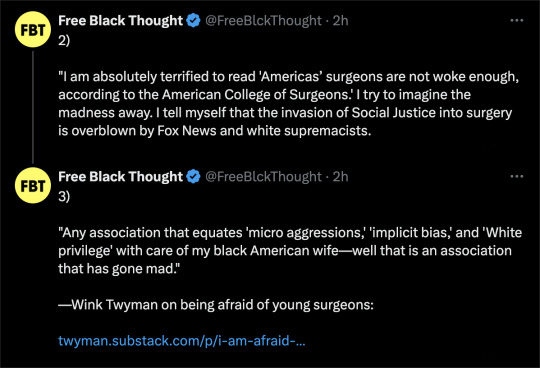
By: Winkfield Twyman, Jr.
Published: Mar 29, 2024
A few years ago, my wife and I faced the health crisis of our marriage. My wife was diagnosed with a brain tumor and she needed immediate surgery. I mean, immediate as in cancel your travel plans to China and get your affairs in order. Write a final letter to your children. Tell them how much you love them. That kind of health crisis was in our lives.
We met with the surgeon, highly regarded as one of the top brain surgeons in San Diego. His credentials were stellar. He spoke with authority. One wants authority before brain surgery. My wife and I never gave a nanosecond of thought to the surgeon’s ancestry or ethnic group. I refuse to so identify the man of medicine who saved my wife’s life on that October day.
I am beside myself with fear when I hear that Social Justice has invaded the medical profession, particularly the delicate area of surgery.
Listen to me please, dear readers.
I do not care about Social Justice when my wife and mother of my children lies under the knife. When she is wheeled into the operating room and the door closes, I trust in one thing – competency. I want competency supremacy when a surgeon cuts into my wife’s skull. You can take your slogan words like white supremacy, oppression, marginalized, diversity, equity and inclusion and pound concrete-hard sand. Better yet, take a flying leap at the moon.
I am absolutely terrified to hear “Americas’ surgeons are not woke enough, according to the American College of Surgeons (ACS).” Do not treat my wife or me or my children as avatars for imagined oppression. We do not need your delusional pity and warped reality.
What is “a blueprint for implementing equitable practices” in medicine? There is no such creature. There is no such protocol. If I present with a brain tumor, assign me the best possible brain surgeon and let the surgeon work magic. I care not whether the surgeon shares my race. Why would I care? Please tell me. Does the tumor care whether my brain surgeon is the descendant of American slavery? I think not. It matters not to the tumor. Nor did it matter to my wife and me and our children on the date of my wife’s emergency surgery.
I would have lost my “retired from Blackness” mind if the exigent operation had been held up so that the hospital could locate a top descendant of American slavery surgeon in southern California. Or, shall I say the ACS has lost its mind to think equity matters in a time of life and death.
I try to imagine the madness away. I tell myself that the invasion of Social Justice into surgery is overblown hysteria by Fox News and white supremacists. My gut knows better. Any association that equates “micro aggressions,” “implicit bias,” and “White privilege” with care of my black American wife – well that is an association that has gone mad.
When a tumor occupies 1/3 of my wife’s cranial space, do I care about young surgeons trained in systemic and structural racism, disparities and black representation in the ACS? Please stop the world and let me get off. Now!
Do not do it, surgeons. Do not lump patients into racial groups. You are not a bean counter. Heal your patient, someone straining to be calm in the face of a dire diagnosis.
It is said that “Critical Race Theory-Related Ideas (are) Found in Programs At 108 of 155 Top American Medical Schools.” Thank God my wife had her emergency brain surgery in October 2016. The tumor is now gone and we bless the surgeon of authority who gave us a new lease on life.
As for today, I am afraid for my family, all descendants of American slavery, in the eyes of diversity, equity and inclusion training for surgeons. I am now afraid of young surgeons.
youtube
#Winkfield Twyman#Winkfield Twyman Jr#DEI#diversity equity and inclusion#diversity#equity#inclusion#DEI must die#corruption of medicine#medical corruption#social justice#critical race theory#American College of Surgeons#brain surgery#woke#wokeness#cult of woke#wokeism#wokeness as religion#ideological capture#ideological corruption#religion is a mental illness
2 notes
·
View notes
Text
Long-Term Health Tips - Managing Chronic Care
Chronic diseases are the primary cause of death and disability, impacting millions of people worldwide. Long-term health conditions necessitate ongoing management.
However, chronic disease management is a complex issue. Preventing and managing chronic diseases often requires people to adopt healthier lifestyle choices like diet, exercise, and habit changes.
Adjusting an already packed schedule can seem daunting. However, with the right approach, navigating these illnesses becomes manageable. It helps you maintain your health and happiness.
Today, we will assist you with taking charge of your long-term health strategies. We will explore the complexities involved and stress the role of preventative healthcare. By the end, you will feel ready to manage your long-term health actively.

Understanding Chronic Disease Management
Chronic illnesses are long-lasting ailments that require continuous medical care. Examples include diabetes, heart disease, and arthritis. Chronic disease management focuses on controlling symptoms, minimizing complications, and enhancing quality of life. For instance, individuals with diabetes may find solace in supplements like Satvam Nutrition Advanced Diabetes Care Supplement alongside traditional medicine to manage their condition.
Chronic disease management focuses on:
Controlling symptoms
Minimizing complications
Enhancing quality of life
Remember, this is a collaborative effort between you, doctors, and specialists. Receiving thorough and efficient care entails following a customized holistic care approach. Effective chronic disease management can help you live an active life and lower complications and sudden hospitalizations.
Accepting Holistic Care Approaches

Traditional medicine is often used to manage chronic diseases. However, holistic care approaches focusing on physical, mental, and emotional well-being are becoming increasingly popular.
These include acupuncture, meditation, and nutritional supplements. They complement traditional medicine and help individuals manage their chronic conditions effectively. Satvam Nutrition Advanced Heart Care Supplement helps to keep blood pressure at bay. Another example of a targeted supplement, Satvam Nutrition Piles Care Supplement, is really helpful for those suffering from piles.
Always discuss complementary therapies with your healthcare provider to ensure they do not interfere with any ongoing treatment plan.
A holistic care approach can help contribute to a more balanced and satisfying life as it explores different angles.
Implementing Preventive Healthcare Measures
Preventive healthcare is the most essential component of thwarting and managing chronic diseases. Research estimates that early intervention could avert about one hospital admission out of every fifteen
Frequent examinations are vital to diagnosing health problems early. Focusing on preventive healthcare measures is a proactive approach to improving health.
Practical Tips for Long-Term Health Strategies
Patient empowerment is central to successful chronic disease management. Staying informed and controlling one's health leads to better long-term outcomes. Patients who actively participate in care plans designed for them experience better results. For individuals with prediabetes, Satvam Nutrition Pre-Diabetes Care Supplement is a potent natural approach towards a healthy life.
Let's check some practical tips to manage chronic illness using holistic care approaches.
Focus on Regular Check-Ups
It is recommended to schedule regular check-ups with your doctor at least once a year.
Regular check-ups enable early detection of health issues, which is essential for maintaining good health.
Early detection of health issues can help you adjust your treatment plan based on the results, leading to better outcomes.
Maintain a Healthy Lifestyle
Focus on your daily habits as it impacts your chronic disease management.
The main focus should be a diet rich in fruits, vegetables, and whole grains.
Aim for at least thirty minutes of vigorous activity on most days of the week.
Consult a doctor or dietitian for personalized guidance tailored to your specific needs.
Getting enough quality sleep, around 7-8 hours per night, is essential for health and well-being.
Prioritize Stress Management
Incorporate stress-reducing activities into your daily routine.
Practice mindfulness meditation or deep breathing exercises.
Engage in hobbies or activities you enjoy to unwind and relax.
Knowledge is Key
Educate yourself about your specific chronic condition.
Use reliable sources like patient education websites or preventive healthcare provider resources.
Don't hesitate to ask your doctor questions to gain clarity in managing your health.
Building Your Support System
Surround yourself with your family, friends, or even a chronic disease support group network.
Talking about your condition and seeking emotional support improves your mental well-being.
Sharing experiences with others who understand your challenges can be invaluable.
Set Realistic Goals
Always be realistic while setting goals for lifestyle changes, keeping in mind your chronic condition.
Break larger goals into smaller, manageable tasks to track progress effectively.
Celebrate achievements along the way to stay motivated and focused on long-term health strategies.
Adjust goals as needed based on changes in your health or circumstances.
Maintaining Consistency is Key
Make sure to follow your doctor's prescription and recommendations diligently.
Adjust dosages or skip medications only after consulting your doctor.
Skipping medication can worsen your condition and lead to complications.
Track Your Symptoms
Try to identify the typical signs and symptoms associated with your chronic condition.
Keep a symptom journal to track any changes. Discuss them with your doctor during appointments.
Conclusion
Taking control of a chronic illness can be life-changing. Work with your medical team, prioritize your health, and seek support. Remember to be proactive and seek more knowledge about your condition. Doing this will help you take charge of your health and live a fulfilling life. Satvam Nutrition, a trusted brand for holistic wellness supplements, offers a range of plant-based nutritional supplements, like Satvam Advanced Joint Care Support Supplement, which makes living with chronic conditions easier.
#chronic illness#chronic disease#Long-term-health-strategies#Holistic-care-approaches#Preventive-healthcare#Patient-empowerment#holistichealth#holistic health
3 notes
·
View notes
Text
The Royal Lineage - Episode 1: "Legacy's Beginnings"
*TW* - Illness
Whitestone Palace - The King's private chambers










3 days later - Bridgemore House














Royal Doctor: [cordially] Your Majesty, I understand you've been feeling unwell. I'll conduct a thorough examination to determine the cause of your symptoms.
King Arthur: [weary] Yes, Doctor. I've been unusually tired, experiencing headaches, and just not feeling myself lately.
Royal Doctor: [thoughtfully] Any changes in your sleep patterns or appetite, Your Majesty?
King Arthur: [reflective] My sleep has been restless, and I've noticed a decrease in appetite. Even a walk in the palace gardens leaves me fatigued.
Royal Doctor: [concerned] I see. I'll conduct further tests to pinpoint the cause. It could be a myriad of factors.
King Arthur: [with a touch of humor] It seems I'm getting the thorough examination today, Doctor.
Royal Doctor: [smiling] Your health is of utmost importance, Your Majesty. Now, I'll perform some routine blood tests to gather more information.
King Arthur: [nodding] Whatever it takes to get to the bottom of this.
-----------------------------------------------------------------------------
3 Days later:
Royal Doctor: [serious] Your Majesty, I have the results of your tests. Care to speak in private?
King Arthur: [nervously] Doctor, tell me the truth. What's the verdict?
Royal Doctor: [gentle, yet firm] Your Majesty, I regret to inform you that the test results indicate a serious illness. You have been diagnosed with an aggressive form of [insert fictional illness]—a condition that requires immediate attention and rigorous treatment.
King Arthur: [quietly] How serious are we talking, Doctor?
Royal Doctor: [compassionate] It's a challenging diagnosis, Your Majesty. This illness progresses rapidly, and we need to act swiftly to implement a treatment plan.
King Arthur: [reflective] What does this mean for my duties, for the kingdom?
Royal Doctor: [thoughtful] Given the urgency, Your Majesty, we must prioritize your health. The kingdom will need to adjust as we focus on aggressive treatment and intensive care.
King Arthur: [resolute] I will face this with the same determination that guided me through battles. The kingdom must remain stable.
Royal Doctor: [supportive] Your Majesty, we will do everything in our power to provide the care you need. Your well-being is our top priority.
---------------------------------------------------------------------------
Princess Bella: [Smiles] Is everything alright, Father?
Princess Bella: [Concerned]: Father ...
#ebodsims#sims 4#sims 4 royal family#sims 4 royal legacy#sims 4 royal story#theroyalfamilyofbrittania#sims 4 royal simblr#ts4 maxis cc#ts4#simblr#The Royal Legacy
5 notes
·
View notes
Text
post mental health clarity
when I got my adhd diagnosis 2 years ago a psychiatrist and a therapist discussed my previous diagnoses with me. More with each other, but I was glad I was there. They were seriously questioning my bpd diagnosis. Or rather the whole “borderline personality disorder, with traits of narcissistic personality disorder and obsessive-compulsive disorder” diagnosis
My history with clinical depression was clear enough. It was assessed by 3 different professionals before even getting the bpd one. They didn’t want to draw any conclusions at the spot. That is also not their line of psychology/psychiatry. But I can. I’ve been doing this shit for 10+ years. To the point where I therapy’d my therapist.
The depression resulting from years of not understanding myself turned into psychosis. When I got out of that, me taking charge of my life and doing something I loved (going to summer school in Korea) was marked as a manic episode. You don’t meticulously plan a manic episode 6 months in advance? Or like the adhd psychiatrist said “That wasn’t manic. That was doing what you loved”
I wasn’t manic, I was simply less depressed after overcoming psychosis
I wasn’t narcissistic, I simply lost touch with other people because I was in a fuckign psychosis.
I wasn’t obsessive or compulsive, despite everything I was working my ass off because my brain wasn’t able to function neurotypically for 20 years.
I don’t blame those who diagnosed me at that time. I do blame my parents and the psychiatrist who sat there and came to the conclusion I didn’t have adhd. Barely asking me anything.
5 years later 4 professionals nearly congratulated me “wow you got super-adhd. Let’s do an autism test, just in case. Oh you don’t react well to ritalin? Okey dokey, let’s try dexamphetaminesulfates. Please keep a diary of how it goes. But we’re sure that won’t be a problem with your perfectionism and people pleasing resulting from 25 years of being misunderstood. Also your above average intelligence, which wasn’t noticed because of your low self esteem. But it looks like you already suspected this. Just needed someone with a degree to confirm that, right? Yeah, we figured as much.”
Moral of the story; get a second opinion. Or a third. Or a fourth.
Mental health is a relatively new line of field and new ways of thought are constantly discussed and implemented.
#laura.txt#read at your own risk#just needed to put this in words somewhere#healing synapses takes time people
3 notes
·
View notes
Note
Emoji Writer Thing, Take Two!
Oh wait, you did 🤩, but it showed up as heart eyes not star eyes so I got confused.
Scratch the last, and perhaps bless us all with 🎆 and 🏆?
haha oh my bad @turanga4 I answered the wrong question!!
🎆 What are you most excited to work on or share in 2023?
I have more Tedromeda coming that will probably spill over into 2023 and I have plans for more fics.
I'd also really like to write more of Lily Luna and my OC Tom, I have some stuff finished for them already but I need to write a couple of fics first to help it make a bit more sense.
🏆 What kept you motivated?
Completely honestly, my ADHD meds. Finally being diagnosed and getting properly medicated (as well as implementing ways to manage my ADHD) has made the world of difference to my life, including being able to actually sit and write stories instead of having them float around in my head and not being able to get them on the page.
(And for @celestemagnoliathewriter because I answered their ask wrong!)
😍 What's one of your favourite lines or exchanges you wrote this year?
There are so many that I've really enjoyed, but I'm going to say it's this bit from Rubs and Disappointments.
“Well McLaggen’s been bragging about the bottle of Ogden’s he stole from his old man, but he’s such a twat he hasn’t realised that Kate Olney only snogged him to distract him while we nicked it.”
Oliver laughed. “How long have you had this firewhiskey and why haven’t you been sharing it?” Katie just shrugged and shouldered his broom before turning to walk out onto the pitch. “Oi! Come on! I’ve just suffered a devastating defeat!”
This is the first little interaction that got stuck in my head and turned into the first fic I had written since I was a teenager, so I'm pretty fond of it. Katie and Oliver were my first HP OTP, and I still have such a love for them.
Ask Game Here
2 notes
·
View notes
Text
Canada not equipped to handle rising rates of dementia: report
Canada is not prepared to handle rising rates of dementia as its population ages, according to a new study by the national seniors’ advocacy organization CanAge.
In its Dementia in Canada report, released on Oct. 18, CanAge warns Canada will face an influx of dementia patients large enough to overwhelm its health-care system between now and 2050.
5 Things to Know newsletter: Sign up to start your day with the biggest stories
Meanwhile, it finds Canada is falling behind in the global race to deal with the complex needs of a rapidly aging population. According to 2021 census data, people 85 and older are now one of the fastest growing demographics in the country.
More than seven million Canadians are currently over 65. In most provinces, that works out to one in six people. So while one sixth of the global population is expected to be over the age of 65 by 2050, Canada has already reached that milestone. In some provinces, the number is closer to one in four.
“Given that the risk of dementia doubles at age 85 to 25 per cent, the window of opportunity to get ahead of an inevitable health care crisis is growing alarmingly slim,” the report reads.
The report follows the release of the World Health Organization’s Global Action Plan on dementia in 2017, which was intended to spur a co-ordinated worldwide approach to addressing the projected growth in people living with cognitive decline.
Part of Canada’s problem, explains CanAge CEO Laura Tamblyn Watts, is that it lacks health-care providers trained in geriatrics who can diagnose dementia early. In 2016, only two out of five Canadian doctors felt well-prepared to manage community dementia care. And while there was one pediatrician for every 2,822 children in 2020, that same year there was one geriatrician for every 20,905 seniors, or 327 geriatricians total.
“We know that, to the degree treatments are available, they must be given early on, and that (is because) the few medications we have only work at the beginning part of the diagnosis,” Tamblyn Watts told CTV’s News Channel on Wednesday.
She said other interventions, including social supports, also work best when applied during the early stages of dementia. However, because there are so few health-care providers specialized in geriatrics and cognitive decline in Canada, relative to the number of seniors, getting diagnosed with dementia early is a challenge.
“In cases where we can’t even get a diagnosis, the challenges are even bigger,” Tamblyn Watts said.
The CanAge report finds dementia specialists tend to be focused in key urban centres, placing aging populations in remote and rural communities, as well as those in other marginalized communities, at greater risk.
“Many people are concerned about getting a formal diagnosis because many people…feel they’re being actively discriminated against. Those feelings are real and based in evidence,” Tamblyn Watts said.
A WAY FORWARD
In order for Canada’s health-care system to manage the inevitable rise in dementia rates, the report calls for timely access to a diagnosis, physicians with dementia training and innovative treatments and technologies for patients; better support for caregivers; and better support, training and access to guidance for health-care workers.
Canada released a national dementia strategy in 2019, making it one of only 39 United Nations member states to do so. However, the CanAge report states there aren’t clear guidelines for how provinces and territories can implement the strategy and measure its success, and that many provinces and territories lack their own clear dementia strategies.
CanAge recommends the federal government collect better data on the prevalence, risk factors and effects of dementia in Canada to better support its strategy. It also suggests the strategy should be updated to include an implementation plan with clear success criteria, and a clear plan for working with the provinces and territories to carry out the strategy locally. It also states the federal government should work to more efficiently transfer funding to the provinces to manage health-care system capacity, labour shortages and dementia support.
“We need to make sure we’re putting dedicated supports aside for health-care providers so they can get the continuing training they need to support their client base that is aging,” Tamblyn Watts said.
from CTV News - Atlantic https://ift.tt/bK9uZAD
4 notes
·
View notes